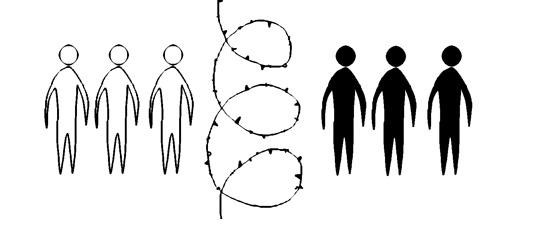Over a century since Kipling’s penned words, the white man’s burden, remains ceaseless and eternal, coagulated by time and ideology.
Take up the White Man’s burden, Send forth the best ye breed
Go bind your sons to exile, to serve your captives’ need;
To wait in heavy harness, On fluttered folk and wild–
Your new-caught, sullen peoples, Half-devil and half-child.
These words written in the days of colonialism still reverberate in our day, though now, the subterfuge of language plays its charades. Burden becomes good will, captive becomes the poor, the illiterate, the downtrodden as Escobar asserted so rightly. But the circuitous language of captivity remains intact. Some sixty years after Franz Fanon wrote Black Skin, White Masks, we are still captive to our desire for whiteness; this desire, not primordial, but dated, rich with historicity, runs thick in our blood — a visceral rhyme that it appears we must sing to our death.
Every colonized people – in other words, every people in whose soul an inferiority complex has been created by the death and burial of its local cultural originality – finds itself face to face with the language of the civilizing nation; that is, with the culture of the modern country. The colonized is elevated above his jungle status in proportion to his adoption of the mother country’s cultural standards. He becomes whiter as he renounces his blackness, his jungle.
Fanon’s words resonate loud and trenchant here. After all, Dhaka is not so different from Fanon’s Martinique. How selfsame we are despite all the miles that separate us and the distance from history. Fairness product is still sold in full license; young men and women still covet and imitate foreign accents. White is the coveted color amongst women of all classes and ages. Some Bengalis also choose to reject the jungle and find themselves knotted inside a thick, sticky, messy pride that germanates from their genital pairing and from being accepted in the white world. International recreational clubs grow more disgruntled with the soaring membership of Bangladeshis with passports that bear their nation’s stamp. Their embassies admonish – do not mix with the ‘locals’ – and they flirt with the idea of separate clubs for the whites and the browns, the ‘originals’ versus the ‘naturalised’. Segregation is their birth right, they must think, the privilege conferred upon them by virtue of the color of their skin. It seems racism is our natural human vice, an atavistic trait, that recurs despite all the progress made, all the oppression thusfar dismantled.
Evolution has yet to make us color blind. On flights, if a white person is seated next to a non-white, that white is generally served first regardless of the origin of the airline carrier and the race of the flight attendant. In schools here, many parents of white children maintain a chilling distance from the others and even brown skin with foreign accent is inadequate in bridging that gulf. Race is so tightly entangled with identity that Otherness is embossed on our skin, imposed upon us, irrespective of upbringing, culture, and language.
These porous borders, this fluidity of life – identity is lost somewhere within the lapse of time and travel; it is insularity, a rigidity of space only, that congeals it apparently. Take the author of this piece for instance. I never felt qualified to call myself an expatriate in all these years of living in Bangladesh. Maybe because I am married to a Bangladeshi, or perhaps the color of my skin, the clothes I chose to wear always made me feel rooted out of any expatriateness. Unless I asserted my foreignness, I was always taken for a Bengali so much so, that in these accumulated years of living in this way, I would feel awkward to walk into, say for instance, the American Club in the presence of those who would immediately perceive me as anything other than American — because to be American is to either belong to a race, white or black, in the absence of which, for others like myself, Americanness must be asserted. I would have to prove my Americanness through my language, my clothes, my attitude and so on. In Dubai, I remember once in one of my numerous trips between London and Dhaka, an airline official eyed my American passport with suspicion and held it in such a way so as to ensure it was in fact genuine. In America, the immigration line is the most painful to bear. This is the space where American pride hits you at the jugular, where big-boned Americans dole out respect in the manner of dog get bone, and where the passport in your hand is the one-all, the cure-all for any vestige of self-respect you have remaining.
But this does not stop Bangladeshis living abroad, to conjugate themselves upon returning, to endlessly and so predictably point out our barbarian flaws as though they belong to a different breed. Missionaries, one and all, they become. A teleology steadfastly rooted in us versus they, reformer versus reformed, jungle versus civilization determines our place, our identity.
The international schools here in Dhaka bring in mostly white men and women qualified to teach us morals, values and manners, and to civilise we the half-devil, half-child sullen peoples of the underdeveloped world. When we reject our own culture, they tell us — it is acceptable to wear a lungi! Even the drudgery of the rickshaw, they glorify with their populism. They become our censor, our go-ahead. Children who attend these schools become familiarised mainly to the achievements of the West – their scientists, statesmen, scholars and writers – so much so that the inferiority of their color and race will only compound over time. Neurosis is their inheritance; the neurosis that to this day compels us to prove ourselves to the white world, that makes us stammer in the presence of a white, that constricts us into perverse inferiority despite all that we achieve and all that we have become.
Thus, the burden is ours, solely ours.
————————————–
Mausumi Mahapatro is an Assistant Professor of North South University.
Source: bdnews24










